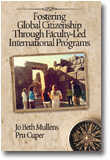
Fostering Global Citizenship
Through Faculty-Led International Programs
By:
Jo Beth Mullens, Keene State College
Pru Cuper, Keene State College
Published 2012
With awareness of both the opportunities and challenges presented by globalization, there is a growing trend among colleges and universities across the country to commit goals and resources to the concept of internationalizing their campuses. This can occur in a number of different ways but a common thread involves exploring the concept of global citizenship and finding ways to embed this concept in undergraduate curricula. For faculty, this may call for moving out of a presumed comfort zone in the traditional classroom and determining new approaches to teaching a generation of students who will live and work in a more global context. A method for accomplishing this work that is growing in popularity involves offering short-term, faculty-led field courses to international settings. In fact, today more college students are participating in such short-term study abroad opportunities than the more traditional semester and/or yearlong programs.
Faculty and administrators who want to capitalize on short-term, study abroad programs as a means for internationalizing their campuses need practical resources to help them realize this challenging but important goal. They not only need support in developing the course curricula and logistics, but also in constructing authentic means for assessing the multi-faceted learning that occurs. Short-term international programs, when carefully planned and executed, engage the participants (both students and faculty) in unique learning experiences that can involve service, research, and critical analysis of what it truly means to be a global citizen. Such work helps define the somewhat nebulous but worthy goals of internationalizing campuses and fostering global citizenship.
The authors of this text are professional educators with deep experience in global education and curriculum development. They offer a valuable resource for the development, execution and assessment of faculty-led international field courses that is at once theoretical, practical and motivational. Whether readers are considering offering an international field program for the first time and need guidance; are veteran field course leaders who would like to take their work to the next level; or are administrators attempting to encourage and provide needed support for faculty-led international programs, this book will prove invaluable.
CONTENTS
Preface. Introduction. PART I: FACULTY-LED INTERNATIONAL PROGRAMS: EXAMINING THE VALUE Chapter 1: Trends That Drive The Need For Change. Chapter 2: Experiential Learning And Student Engagement. Chapter 3: Sense Of Self And Reflective Growth. Chapter 4: Promoting Global Citizenship. Chapter 5: Personal And Professional Faculty Development. PART II. INTERNATIONAL PROGRAM ORGANIZATION: UNDERTAKING THE TASKS Chapter 6: The World Is Your Classroom: Selecting The Country And The Setting. Chapter 7: Designing And Planning The Essentials. Chapter 8: Passports, Liability And Dealing With The Unexpected. Chapter 9: Filling The Roster. PART III. THE LEARNING: REALIZING THE POTENTIAL OF FACULTY-LED IINTERNATIONAL PROGRAMS Chapter 10: Learning Objectives And Assessment: You Can’t Have One Without The Other. Chapter 11: Predeparture Preparation: Setting The Stage For International Learning. Chapter 12: Learning During The Journey. Chapter 13: Reentry And Beyond: Sustaining And Forwarding What Has Been Gained. Conclusion. References.
REVIEWS
"An immersion experience in another country weeks in duration, rather than months, fits into natural breaks in the academic calendar, costs less for students (although it is by no means inexpensive), and can serve a relatively larger number of students. The key question, then, becomes how to effectively use a short period of time (perhaps only two weeks) to instill sufficient intercultural competencies to make the experience worthwhile.
Fostering Global Citizenship not only answers these questions but also is a literal "how-to" book in the nest send of the phrase. It provides clear, detailed, and practical information concerning every phase of a short-term international program, including course curriculum development; travel planning; university policies and procedures to support the program, marketing and promotion; actual travel logistics; development of evidence-based student learning outcomes; rubrics; assessment; and program evaluation. Although all of these areas are important for ensuring a successful, smooth-running international experience, it is the book's information about pedagogy and educational effectiveness for intercultural competence this is most significant." Russ Newman in Contemporary Psychology
"This book could serve as a catalyst for inspiring more faculty to consider ways of establishing team-taught courses at their respective insitutions." Joanne Maguire Robinson University of North Caroline at Charlotte
-
Paperback978-1-61735-831-9
Web price: $45.04 (Reg. 52.99)
-
Hardcover978-1-61735-832-6
Web price: $80.74 (Reg. 94.99)
- eBook978-1-61735-833-3

- EDU003000 - EDUCATION: Aims & Objectives
- EDU037000 - EDUCATION: Research
- EDU029020 - EDUCATION: TEACHING METHODS & MATERIALS: Reading & Phonics
-
 (Re)Envisioning Social Studies Education Research
Current Epistemological and Methodological Expansions, Deconstructions, and Creations
(Re)Envisioning Social Studies Education Research
Current Epistemological and Methodological Expansions, Deconstructions, and Creations
-
 American Educational History Journal - Golden Anniversary Edition
Volume 50 Numbers 1 & 2
American Educational History Journal - Golden Anniversary Edition
Volume 50 Numbers 1 & 2
-
 Distance Learning
Volume 20 #3
Distance Learning
Volume 20 #3
-
 Distance Learning
Volume 20 #4
Distance Learning
Volume 20 #4
-
 Faculty Development
Achieving Change Through Action Research
Faculty Development
Achieving Change Through Action Research
-
 Qualitative Research With Diverse and Underserved Communities
Qualitative Research With Diverse and Underserved Communities
-
 Quarterly Review of Distance Education
Volume 24 #1
Quarterly Review of Distance Education
Volume 24 #1

